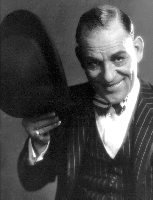|
A Skullduggery Spotlight On Lon Chaney, Sr. (1883 - 1930)
Born Alonzo Chaney on April Fool's Day in 1883, he was the second of four children from parents who were both deaf-mutes. In the very beginnings of his childhood, it seemed that the theatre was in his blood. As a young child, he developed a unique way of communicating with his parents using a form of pantomime, telling stories with his face, hands, and body. Despite his mother’s handicap, she oversaw children’s school projects, which involved pantomimes, and one-act sketches - many featuring a three year-old Chaney. Before the age of 10, Chaney had to quit school because his mother became disabled by inflammatory rheumatism, leaving him to care for his younger brother and sister. By age 12, he secured work for himself as a prop boy in a local Colorado Springs theater where his older brother John had also been working. He had other odd jobs, which included summer work as a Pike’s Peak guide. His father, a local barber, felt that one member in the family working in the theatre was enough, so he financed young Chaney to get an interior decorating job. Chaney worked successfully for three years at a drapery firm until the theatre called to him again. His brother John wrote to him relating that he and the local stagehands' union were going to stage the comic opera Said Pasha. Chaney gave his resignation at the drapery firm and quickly joined his brother at the theater. The operetta was a success. This spawned a relatively successful string of more shows, mostly operettas and musicals, all of which were produced by the resourceful and multi-talented Chaney brothers. Lon Chaney was very articulate, both mentally and physically; able to pick up the latest dance routines and steps, like buck and wing, tap, soft-shoe, and more. This all came very easy to him, as he polished his repertoire of dances and cultivated his comedic talents in the next few years. In 1901, as vaudeville and legitimate theatre flourished throughout the land, the Chaney brothers took their act on the road. After a long tour throughout most of Colorado however, the pair ran into financial adversities, and brother John decide to sell out his share to their company's tenor Charles Holmes. Lon decided to stay on, as the company traveled throughout the Southern U.S. and parts of Florida. A weekly paycheck of $12.00 was enough in those days to keep Chaney "afloat" as he continued to produce and perform more shows. He acquired considerable experience in nearly every aspect of theatre, including: wardrobe, transportation, set construction, props, stage managing, acting, singing, dancing, and make-up. In 1905, during engagements with another company in Oklahoma City, Lon Chaney encountered romance in the lovely form of Cleva Creighton, a 15 year-old choir singer who sought work in his troupe. Interestingly, within only three days after their first meeting, the two were married with permission from Cleva's parents. A year later, their son Creighton was born (who would years later become known as Lon Chaney, Jr.). In the next few years, the Chaney family would find itself moving with one stock company after another; from the Carolinas to Halifax and Nova Scotia in Canada; then westward through lumber and mining camps to Vancouver. Chaney once claimed that he knew every good and bad rooming house…the bad ones often replete with cockroaches and bedbugs. As was so often the case, a company would fold and Chaney would have to count his pennies. Luckily, most local saloons would supply all the free lunch one could filch on a nickel’s worth of beer. Chaney would often be seen walking away from these places with his overcoat pockets bulging from wrapped cheese, meat, and bread - after filling up on a large meal himself. After a lean period, Chaney held a stage managing job in Chicago, until he signed a contract to do short musical sketches seven times daily, seven days a week, for the Olympic Theater in Los Angeles. During this period, he also worked for the Grand opera House Company, where he met such upcoming luminaries as Roscoe "Fatty" Arbuckle and future film star/director Robert Z. Leonard. After about a year and a half of this, Chaney became engaged by several vaudeville and comic opera companies, which took him from one end to California to another. His marriage by this time, however, was deteriorating. It has been speculated that perhaps he was too engrossed in his career. Certainly, it can be argued that years later, when he attained stardom, he was a bit self-centered if not anti-social. It can also be argued that he was well-intentioned and sincerely never intended to hurt anyone. There is evidence that points to a rivalry between Lon and Cleva; because of her beauty, talent, and charms, she was earning better wages than he at the time, while he was still unrecognized and struggling in show business. Petty quarrels developed into bitter harangues as Lon insisted that Cleva be more of a homemaker and a mother than a "glamour queen". Pressure mounted, until Cleva attempted to take her own life backstage one evening while Lon was performing (by swallowing mercury). Feeling remorseful, Lon kept a constant vigil at her bedside in the hospital. Upon her complete recovery however, he immediately left her, was granted a legal separation, and assumed full custody of Creighton. He never returned to Cleva again. By 1914, Chaney had made a complete transition from stage to film after two years of hard work. He was pleased to see that Hollywood needed a versatile character actor in their burgeoning young film colony. Chaney knew the future of vaudeville was waning near, and this new industry would take the world by storm. In April of 1914, Chaney finally divorced Cleva, and next married an old friend, Hazel Hastings. Cleva's career was now in ruin, her suicide attempt having permanently injured her voice. In an oddly gracious manner, she showed no resentment and even appeared gallant by accepting most of the blame for the break-up of her marriage. Sadly, while Hazel was legitimately trying to be a devoted mother and wife, Lon had misled his son Creighton into believing his real mother, Cleva, had died. The boy never forgot his mother and how much he had loved her, and when he learned a few years later that he had been deceived, his relationship with his father was seriously damaged for many years. |

 Arguably one of the greatest character actors of
the
Arguably one of the greatest character actors of
the